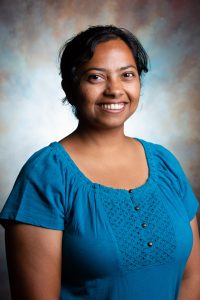Featuring Professor Haritha Malladi, Civil & Environmental Engineering

I love teaching first- and second-year engineering courses like statics and strength of materials, where students learn the fundamentals of engineering. It’s very rewarding to see the spark of understanding and joy in students when they crunch in numbers and finally arrive at the correct answer after struggling with a problem. I want students to learn to trust themselves as engineers capable of solving even the most complicated-looking problems.
Today we highlight the teaching contributions of Professor Haritha Malladi who is visiting in the Department of Civil and Environmental Engineering and new to Lafayette. Professor Malladi teaches foundational courses in statics and the strengths of materials. Her visiting appointment affords her the perfect opportunity to use her expertise and passion for engineering instruction at a teaching-focused institution. Prior to arriving at Lafayette, she taught similar courses at North Carolina State University where she also completed their nationally recognized Preparing for the Professoriate program and Certificate of Accomplishment in Teaching to prepare her to become an excellent teacher and scholar.
The courses Professor Malladi teaches are heavily focused on problem-solving. She typically works through sample problems with the class using a document camera, provides opportunities for students to problem-solve during class, and serves as a guide by assisting her learners along the way. Each class she equips students with skeleton notes, and encourages learners to treat their homework assignments as if they were tests. Students, including those with accommodations, have shared with her their appreciation for her teaching methods.
In addition to teaching subject matter that she loves, Professor Malladi takes part in a variety of opportunities and discussions occurring at the College around teaching and learning. She is a member of Lafayette’s inaugural Scholarship of Teaching and Learning (SoTL) Community of Practice. Currently the SoTL group is learning how to design a scholarly research project focused on teaching and learning. Professor Malladi’s proposed project will examine the potential learning benefits when students grade their own homework assignments. She is particularly interested in understanding whether through this approach students can uncover patterns in their mistakes to promote learning.
Professor Malladi also participates in the Teaching Squares Program and is part of a Faculty Writing Group. She describes what she has learned or gained from different initiatives:
Through the SoTL community of practice, I’m learning how to methodologically test the choices we make in the classroom to maximize student learning. Having the group serve as a sounding board has helped me frame my pedagogical questions in a systematic and scientific manner. As a new member of the Lafayette community, being a part of the SoTL group as well as the Teaching Squares program was a great way for me to connect with faculty members from other departments outside of my cohort. I learned a lot from observing classes outside of my discipline… ways to moderate discussions and use classroom resources differently in my problem-solving-based classroom.
During the last eight months, Professor Malladi has benefited greatly by being at Lafayette. In reflecting over the last academic year, she indicates:
I’m grateful to be immersed in an environment where everyone is passionate about undergraduate education. I’m continuing to hone my teaching skills while being able to connect individually with my students.